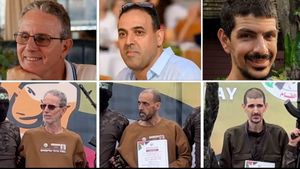During recent celebrations of LGBTQ+ rights, Thailand emerged as a vibrant hub advocating for inclusivity and human rights. The nation's pride festivals have not only showcased cultural diversity but also highlighted the pressing issues facing LGBTQ+ individuals within Thai society. Advocates argue for more acceptance, drawing attention to the systemic challenges, legal barriers, and societal prejudices still prevalent.
Festivals like Bangkok Pride have transformed from mere celebrations to platforms for advocacy and awareness. This year's Bangkok Pride, held on June 24, 2023, attracted thousands of participants, calling for the advancement of LGBTQ+ rights, including the push for legal recognition of same-sex unions. The festival, featuring colorful parades and performances, served as both celebration and protest against discrimination.
One of the prominent figures at this year’s festival was activist Jittisak Sangsri, who stated, “We will continue to fight for our rights until we are recognized as equals. Our presence today shows unity and determination.” This sentiment resonates deeply among many activists who feel the struggle for LGBTQ+ rights is far from over.
Despite progressive developments, such as the 2018 announcement by the Thai cabinet to support civil partnerships for same-sex couples, activists contend these measures fall short of equal marriage rights. According to the Thai Lawyers for Human Rights, there is still significant legislative inertia, and many LGBTQ+ individuals experience discrimination in areas such as employment and housing.
Legal challenges continue to impede full equality. The absence of comprehensive anti-discrimination laws to protect LGBTQ+ rights remains a significant concern. Human rights organizations like Amnesty International have voiced persistent calls for the Thai government to abolish existing discriminatory laws and implement protective measures.
Internationally, LGBTQ+ rights are increasingly recognized, leading to condemnation of oppressive measures against sexual minorities. With rising global visibility, events like Pride are more than just local happenings—they are part of a larger movement advocating for universal human rights. Activists believe collaboration with global LGBTQ+ organizations could amplify their efforts domestically.
Festivals also offer solidarity among affected communities. Many attendees shared stories of resilience, showcasing how festivals can serve as sanctuaries of support and celebration. For example, participant Kanya Punyo, who attended the festival with her partner, expressed enthusiasm, stating, “This is more than just fun; it’s about visibility and connection. It reminds us we are not alone.”
The cultural significance of these celebrations cannot be overstated. Festivals have helped cultivate visibility and acceptance over the years, but the growth of interest from both locals and tourists signals Thailand as a spot of progressive change within Southeast Asia. Events such as Bangkok Pride demonstrate the country’s vibrant LGBTQ+ culture and the pressing need for legal recognition and support.
Critics raised concerns over commercialization of pride events, arguing authenticity often suffers when corporate sponsorships overshadow grassroots activism. Yet, proponents counter the potential for broader awareness and fundraising can accelerate change. “Corporate support can lead to tangible benefits,” remarked event organizer Ratana Jirakoset. “It’s not always about money; it's the message and the visibility.”
Thailand’s tourism heavily features LGBTQ+ inclusivity, bringing visitors drawn by its reputation of acceptance. The ripple effect of these festivals contributes to the economy and also encourages local businesses to adapt and be more inclusive. This trend is increasingly evident, as many venues across urban areas modify policies to cater to diverse clientele.
Still, challenges remain; societal stigma faced by many LGBTQ+ individuals can lead to isolation and discrimination, particularly among younger members of the community. Educational programs aimed at youth are becoming increasingly necessary to combat prejudice from within society. Activists advocate for school curriculums to include LGBTQ+ themes to cultivate acceptance from early ages.
Critics of the government’s stance argue for more direct action. Political delineation continues around issues of LGBTQ+ rights, as governmental support can often lag behind societal progress. Grassroots movements are fundamental, as they provide activism centered on personal experiences and community engagements. Many propose forming alliances with political representatives to directly influence future laws.
Overall, the events surrounding Thailand’s LGBTQ+ rights festivals reveal much about the cultural and social fabric of the nation. The dichotomy between celebration and struggle speaks to both the progress made and the work still needed. Each step forward is met with the call for equal recognition, acceptance, and rights for all individuals, regardless of sexual orientation or gender identity. Activists remain resolute, ensuring their voices echo far beyond the festival grounds.
The Spanish proverb aptly fits the LGBTQ+ campaigns worldwide: “La unión hace la fuerza” (Unity makes strength). By continuing to unite under banners of pride, community members articulate their hopes for transformation and the indispensable fight for equality.



